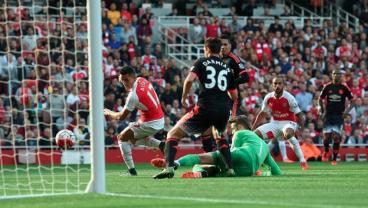The World Cup was an absolute shit show for Argentine manager Jorge Sampaoli. Jettisoned into the job in May of 2017 as the savior of Argentina’s horrendous qualifying campaign, the former Sevilla boss managed to secure passage to Russia on the final match day (although Lionel Messi’s hat trick in Quito certainly helped).
However, with one armageddon avoided, the next promptly arrived — the finals themselves revealed what many had known about La Albiceleste since the cycle began: The beaten 2014 finalists weren’t very good anymore, apart from Messi.
Sampaoli quickly transformed into the human embodiment of stress on the touchline and purveyed about as much cool as a midfield pairing of Enzo Perez and 34-year-old Javier Mascherano.
A shocking 1-1 draw with Iceland was followed by a crushing 3-0 defeat to Croatia, and then rumors of an Argentina player revolt and coup, making Sampaoli’s presence little more than that of a figurehead, began circulating.
However, in his first extended interview since the follow-up victory over Nigeria and the subsequent elimination at the hands of France in the Round of 16, Sampaoli has refuted the over-the-top reporting of the player meetings while calling for a paradigm shift in Argentina’s footballing culture.
“The national team is a place where there’s a sense of immediacy, where everyone of us was forced to win; there was no room for any mistakes, and changing that was really hard,” Sampaoli said. “The baggage this team carried was too heavy, the pressure made it too hard for talent to emerge.
“For us and the players it wasn’t a game anymore, although there was a great commitment. We traveled to see the players and we talked a lot with them. It was a very hard job that didn’t end up prospering because there was only one option: to be world champions. And in that obligation, before any adversity, everything was more complex. We could never enjoy. The goal was always too high.”
And while the pressure facing Argentina’s players — most infamously highlighted by Messi’s face during the playing of the national anthem before the Croatia match — was suffocating, Sampaoli admits that he struggled to get the team to play in a coherent manner.
“I take responsibility that I couldn’t introduce my style to the national team, what I feel is football,” he said. “That will benefit me in the future, because I want to enjoy the game. Look what happened at the World Cup. It finished with a country winning on the counterattack. And one of my favorites, who was Spain, was knocked out fast.
"The champion won with a style of recovering balls and long runs. Therefore, those of us who love the game are one step behind when it comes to competing. Nowadays, it is much easier to not play and take advantage of a chance which can decide a game.”
But the coach is also adamant that the media circus which surrounded his side did nothing to help matters, especially with regards to the player meetings.
“Their meetings were always something positive, but things that were out of our control got inside our training camp. I was not mad about the players holding meetings between them; I was mad when those meetings were blown out of proportion by the media. The players that won the 1986 World Cup for Argentina had meetings, but we knew about them 20 years later.
“I believe philosophically in participation and commitment. In football and in life. We get together to find solutions and, if that ends up being in the living room of houses because the television says it or on the screen of a cell phone through social media, the opposite occurs. In this context, the worst thing would be for us to come together to destroy or become skeptical towards each other.”
However, there’s one element of Argentina’s 2018 World Cup in which Sampaoli could find no fault — the commitment and performance of Messi.
“It was amazing, especially to see him so committed and suffering a lot when he didn’t win,” Sampaoli said. “The best player in history was very committed. Leo suffered like none other and it hurt him when he was not able to help the group.
“Having him around forces you to live up to the hype, and sometimes you can and sometimes you can’t. Coaching Leo leaves no room for mistakes and forces you to win.”
And while Sampaoli believes that Messi’s current break from the national team is simply a personal decision that must be respected, the manager believes Argentina could still lift the 2022 World Cup with the Barcelona captain in the side.
“Of course, yes, but this needs a process, for everything that happened up to now and you don’t break the process, you correct it. For the next World Cup or Copa America you need organization, unlimited confidence and the knowledge that everything requires a process. If you don’t win the Copa America, you have to keep the process, not break it. Enough of this madness that if you do not win, you are a loser. It’s not like that. If you believe, you can win later. But you have to believe.
“That’s why they will have to change, because with those values we have not done very well lately neither as a society nor in football. It is the hysteria of immediacy, to win by all means and that’s not possible. Projects, time, correct mistakes … I hope it happens in the future. In my time, my style was not even talked about or criticized. There was talk of wanting to win by all means, and I don’t understand that.”
Sampaoli also says he’s not bitter about being kicked to the curb by the AFA despite signing a five-year contract just over a year ago.
“No, on the contrary,” he said. “I’m grateful that they gave me the chance. The president of the AFA — Chiqui Tapia — also lives in this world of obligation, necessity and immediacy, in which I was too. What can I resent about Chiqui, if he is partly a victim of the obsession with being successful in Argentine society?”






